List of reptiles of Bulgaria

Bulgaria is a country in southeastern Europe situated entirely in the Balkan peninsula. The country is inhabited by 39 reptilian species, which makes reptiles the second least diverse class of vertebrates in the country, after Bulgaria's amphibians.[1] The list includes four species that have not been recorded in the country since the first half of the 20th century – the loggerhead sea turtle, green sea turtle, aspic viper and meadow viper. There are four turtle and two tortoise species of four families – Cheloniidae, Emydidae, Geoemydidae and Testudinidae; fifteen lizard species of four families – Anguidae, Gekkonidae, Lacertidae and Scincidae; and eighteen snake species of four families – Boidae, Colubridae, Typhlopidae and Viperidae. In addition, in recent years one turtle species, the North American pond slider, has been observed in numerous bodies of water all over the country; it has not reproduced successfully in the country and is not included in the list.[2][3] The other two extant orders, Crocodilia and Rhynchocephalia, are not represented in Bulgaria.
The foundations of Bulgarian herpetology, or studies of amphibians and reptiles, were laid in the end of the 19th century by the teacher Vasil Kovachev, who published a number of articles on the subject and the 1912 book Herpetologic Fauna of Bulgaria.[4] In the 1930s and 1940s, the zoologist Ivan Buresh and his associate Yordan Tsonkov conducted in-depth research on the diversity and distribution of the amphibian and reptile species in the country. In the second half of the 20th century the leading Bulgarian herpetologist was Dr. Vladimir Beshkov.[4]
Bulgaria provides various habitats for reptiles. The country falls within six terrestrial ecoregions of the Palearctic realm: Balkan mixed forests, Rodope montane mixed forests, Euxine-Colchic deciduous forests, Aegean and Western Turkey sclerophyllous and mixed forests, East European forest steppe, and Pontic–Caspian steppe.[5] Bulgaria has varied topography. From north to south the main geomorphological regions are the Danubian Plain, the Balkan Mountains, the Sub-Balkan valleys, the Rila–Rhodope massif to the south-west, the Upper Thracian Plain and the Strandzha mountains to the south-east. Most of the country is situated within the humid continental climate region, with Alpine climate in the highest mountains and Mediterranean climate in the southernmost regions.[6] The highest diversity of reptiles is recorded in southernmost Bulgaria – the valley of the river Struma, the eastern Rhodope Mountains, the southern reaches of the river Maritsa and Strandzha.[citation needed] Reptiles are also most diverse at low altitudes; 15 species occur below 200 m (660 ft), and only five species are common above 1,200 m (3,900 ft).[7]
Status
[edit]The worldwide (not specific to Bulgaria) conservation status of species is based on their placement in one of the following categories from the IUCN Red List.
|
|
|
Most of the reptile species found in Bulgaria have been categorised as least concern or not evaluated. Four species are near-threatened (the European pond turtle, meadow lizard, four-lined snake and Hermann's tortoise), two species have been designated vulnerable (the meadow viper and spur-thighed tortoise) and two species are classified as endangered (the loggerhead sea turtle and green sea turtle).
Order Testudines
[edit]Family Cheloniidae
[edit]Cheloniidae are a family of sea turtles with worldwide distribution in all tropical oceans. The family contains seven species in five genera,[8] of which two species have been recorded in the waters off the Bulgarian Black Sea Coast.[9]
| Species | Common name | Distribution | Status | Image |
|---|---|---|---|---|
| Caretta caretta | loggerhead sea turtle | Recorded twice along the Bulgarian Black Sea Coast, off Shabla and Primorsko[10] | 
| |
| Chelonia mydas | green sea turtle | Recorded only once along the Bulgarian Black Sea Coast, off Sozopol[12] | 
|
Family Emydidae
[edit]Emydidae, also known as pond or march turtles, are a family of fresh water turtles. With the exception of two species, they are only found in the Western Hemisphere. There are close to 50 species in 10 genera,[14] of which one species occurs in Bulgaria.[15]
| Species | Common name | Distribution | Status | Image |
|---|---|---|---|---|
| Emys orbicularis | European pond turtle | Found in the rivers and lakes all over the country; recorded up to 1,100 m (3,600 ft) altitude on Lozen Mountain[16] | 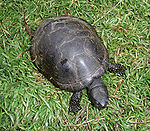
|
Family Geoemydidae
[edit]Geoemydidae are one of the largest and most diverse turtle families. They are distributed in North America, northern South America, Europe, northwestern Africa and Asia. The family contains about 70 species in 19 genera,[18] of which one species occurs in Bulgaria.[19]
| Species | Common name | Distribution | Status | Image |
|---|---|---|---|---|
| Mauremys rivulata | Balkan pond turtle | Found in the southernmost regions of the country: the lower course of the rivers Struma, Arda, Maritsa and Tundzha, as well as in the rivers south of the Ropotamo along the Black Sea coast[20] | 
|
Family Testudinidae
[edit]Testudinidae, also known as tortoises, are a family of land-dwelling turtles found in North and South America, Europe, Africa and Asia. They are terrestrial and inhabit warm areas ranging from rain forests to deserts. The family contains about 50 species in 11 genera,[22] of which 2 species are found in Bulgaria.[23]
| Species | Common name | Distribution | Status | Image |
|---|---|---|---|---|
| Testudo graeca | Greek tortoise | Found in the lowlands of the country: the Danube and Upper Thracian Plains, the Black Sea coast and some river valleys[24] | 
| |
| Testudo hermanni | Hermann's tortoise | Found in the lowlands of the country: the Danube and Upper Thracian Plains, the Black Sea coast and some river valleys; recorded up to 1,450 m (4,760 ft) altitude in the mountains[26] | 
|
Order Squamata
[edit]Suborder Lacertilia
[edit]Family Anguidae
[edit]Anguidae are a family of legless lizards distributed in the Northern Hemisphere. The group includes both egg-laying and viviparous species. There are 73 species in 10 genera,[28][29] of which three species occur in Bulgaria.[30]
| Species | Common name | Distribution | Status | Image |
|---|---|---|---|---|
| Anguis colchica | Eastern slowworm | Found in most regions of the country[31][32] | 
| |
| Anguis fragilis | common slowworm | Rhodope Mountains[31][32] | 
| |
| Pseudopus apodus | European legless lizard | Occurs in the lowlands of south-eastern Bulgaria and along the Black Sea coast, with isolated populations in the lower valleys of the rivers Rusenski Lom and Struma[35] | 
|
Family Gekkonidae
[edit]Gekkonidae are a large family of small to mid-size geckos. They have global distribution with particular diversity in tropical areas. Gekkonidae include 1033 species in 51 genera,[37] of which two species is found in Bulgaria.[38]
| Species | Common name | Distribution | Status | Image |
|---|---|---|---|---|
| Mediodactylus kotschyi | Kotschy's gecko | Found in south-eastern Bulgaria, including the Upper Thracian Plain and the eastern Rhodope Mountains, as well as along the lower Struma valley[16] | 
| |
| Mediodactylus danilewskii | Mediterranean thin-toed gecko | Found along the Black Sea coast of Bulgaria[40] | 
|
Family Lacertidae
[edit]Lacertidae are a family of true lizards or wall lizards native to Europe, Asia and Africa. The European and Mediterranean species inhabit mainly forest and scrub habitats.[42] There are 321 species in 37 genera,[43] of which nine species occur in Bulgaria.[44]
| Species | Common name | Distribution | Status | Image |
|---|---|---|---|---|
| Darevskia praticola | meadow lizard | Found in most of the country, except for the south-western regions and the Upper Thracian valley[44] | 
| |
| Lacerta agilis | sand lizard | Found in Rila, Pirin, western Rhodope Mountains, western and central Balkan Mountains, Sredna Gora and Osogovo, as well as isolated populations in Strandzha and the northern Black Sea coast[46] | 
| |
| Lacerta trilineata | Balkan green lizard | Most common in the lowlands of eastern Bulgaria, as well as in the lower Struma valley[48] | 
| |
| Lacerta viridis | European green lizard | Common throughout the country, except for the highest mountains[50] | 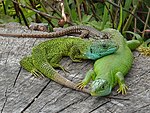
| |
| Ophisops elegans | snake-eyed lizard | Inhabits only a small area in the eastern Rhodope Mountains and the lower valley of the Maritsa river[52] | 
| |
| Podarcis erhardii | Erhard's wall lizard | Occurs in south-western Bulgaria and the eastern Rhodope Mountains[54] | 
| |
| Podarcis muralis | common wall lizard | Widespread throughout the whole country[56] | 
| |
| Podarcis tauricus | Balkan wall lizard | Found in the lowlands of northern and eastern Bulgaria, as well as in the lower Struma valley[58] | 
| |
| Zootoca vivipara | viviparous lizard | Found in Rila, Pirin, Vitosha, the western Rhodope Mountains, the western and central Balkan Mountains and Osogovo[60] | 
|
Family Scincidae
[edit]Scincidae are a cosmopolitan family occurring in a variety of habitats worldwide, apart from boreal and polar regions. With 1589 species, of which one is found in Bulgaria,[62] Scincidae are among the most diverse lizard families.[63]
| Species | Common name | Distribution | Status | Image |
|---|---|---|---|---|
| Ablepharus kitaibelii | European copper skink | Found throughout the whole country, except for some areas to the south-west[64] | 
|
Suborder Serpentes
[edit]Family Boidae
[edit]Boidae are a family of nonvenomous snakes found in America, Africa, Europe, Asia, and some Pacific Islands. There are 58 species in 8 genera,[66] of which one species occurs in Bulgaria.[67]
| Species | Common name | Distribution | Status | Image |
|---|---|---|---|---|
| Eryx jaculus | javelin sand boa | Found in south-eastern Bulgaria, as well as in isolated populations in the lower Struma valley and around Svishtov along the Danube river bank[68] | 
|
Family Colubridae
[edit]Colubridae are a family of snakes with worldwide distribution found on every continent except Antarctica. There are 844 species in 118 genera,[70][71] of which 12 species occur in Bulgaria.[72]
| Species | Common name | Distribution | Status | Image |
|---|---|---|---|---|
| Coronella austriaca | smooth snake | Found in the whole country, up to 1,600 m (5,200 ft) altitude; rarely recorded up to 2,200 m (7,200 ft)[73] | 
| |
| Dolichophis caspius | Caspian whipsnake | Inhabits most of the country, except for the high mountains of southwestern Bulgaria[75] | 
| |
| Elaphe quatuorlineata | four-lined snake | Found only in the southern Struma valley[77] | 
| |
| Elaphe sauromates | blotched snake | Occurs in the Upper Thracian Plain, the Danubian Plain, Dobrudzha and the Black Sea coast[79] | 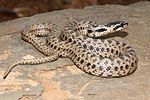
| |
| Malpolon monspessulanus | Montpellier snake | Found in southern Bulgaria: lower Struma valley, eastern Rhodope Mountains, Dervent Heights and Strandzha[81] | 
| |
| Natrix natrix | grass snake | Found all over the country[83] | 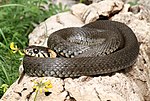
| |
| Natrix tessellata | dice snake | Occurs all over the country, up to 1,100 m (3,600 ft) altitude[85] | 
| |
| Platyceps collaris | red whip snake | Found in several populations along the Black Sea coast to the south of Sozopol[87] | 
| |
| Platyceps najadum | Dahl's whip snake | Found in south-western Bulgaria, the eastern Rhodope Mountains, the northern foothills of the western Rhodope Mountains and the Dervent Heights[89] | 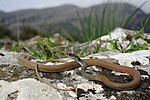
| |
| Telescopus fallax | European cat snake | Found in the southern Struma valley and the eastern Rhodope Mountains[91] | 
| |
| Zamenis longissimus | Aesculapian snake | Widespread throughout the whole country, up to 1,600 m (5,200 ft) altitude, rarely recorded up to 2,000 m in Belasitsa[93] | 
| |
| Zamenis situla | European ratsnake | Found in the southern Struma valley, the foothills of the western Rhodope Mountains and the southern Black Sea coast[95] | 
|
Family Typhlopidae
[edit]Typhlopidae are a family of blind snakes found mostly in the tropical regions of Africa, Asia, the Americas, Australia and various islands. There are 381 species in 29 genera,[97] of which one species is native to Bulgaria and Europe.[98]
| Species | Common name | Distribution | Status | Image |
|---|---|---|---|---|
| Typhlops vermicularis | European blind snake | Found in southern Bulgaria: lower Struma valley, eastern Rhodope Mountains, Dervent Heights and Strandzha, and the southern Black Sea coast[98] | 
|
Family Viperidae
[edit]Viperidae are a family of venomous snakes found worldwide, except in Antarctica, Australia, New Zealand, Ireland, Madagascar, Hawaii and various other isolated islands. They include 329 species in 33 genera,[97] of which four species occur in Bulgaria.[100]
| Species | Common name | Distribution | Status | Image |
|---|---|---|---|---|
| Vipera ammodytes | horned viper | Found in the whole country, up to 1,450 m (4,760 ft) altitude[101] | 
| |
| Vipera aspis | aspic viper | Only two specimens have been recorded in Bulgaria – one found near Harmanli in 1933, the other in unknown location in the beginning of the 20th century[103] | 
| |
| Vipera berus | common European adder | Occurs in the mountains, at an altitude of 1,000–2,700 m (3,300–8,900 ft) – Rila, Pirin, Vistosha, western Rhodope Mountains, western and central Balkan Mountains, central Sredna Gora and Osogovo[105] | 
| |
| Vipera ursinii | meadow viper | Known only from a few specimens found in the Shumen Plateau and on Lyulin Mountain; there were no records since 1934[107] until in 2003 a specimen was collected in Ludogorets Plateau in northeastern Bulgaria[108] | 
|
See also
[edit]- Geography of Bulgaria
- List of amphibians of Bulgaria
- List of birds of Bulgaria
- List of mammals of Bulgaria
- List of protected areas of Bulgaria
References
[edit]- ^ Biserkov, 2007, p. 34
- ^ Biserkov, 2007, p. 71
- ^ Tzankov, Nikolay; Popgeorgiev, Georgi; Kornilev, Yuri; Natchev, Nikolay; et al. (July 2015). "First survey on the invasive Pond slider (Trachemys scripta) in Bulgaria: historic development and current situation" (PDF). Hyla: Herpetological Bulletin. 2015 (1): 18–27. ISSN 1848-2007. Retrieved 13 July 2017.
- ^ a b Biserkov, 2007, p. 28
- ^ "Ecoregions of Bulgaria". The Encyclopedia of Earth. Archived from the original on 6 July 2015. Retrieved 13 July 2015.
- ^ Donchev, Karakashev, 2004, pp. 55, 59–61
- ^ Petrov, Boyan (2007). "Amphibians and Reptiles of Bulgaria: Fauna, Vertical Distribution, Zoogeography, and Conservation" (PDF). In Fet, Victor; Popov, Alexi (eds.). Biogeography and Ecology of Bulgaria (PDF). Monographiae Biologicae. Vol. 82. Dordrecht: Springer Science+Business Media. pp. 85–107. doi:10.1007/978-1-4020-5781-6_4. ISBN 978-1-4020-5781-6. Retrieved 13 July 2017.
- ^ "Cheloniidae". Animal Diversity Web. Archived from the original on 2 April 2015. Retrieved 25 March 2015.
- ^ Biserkov, 2007, p. 74
- ^ Biserkov, 2007, p. 75
- ^ Casale, P.; Tucker, A.D. (2017). "Caretta caretta". IUCN Red List of Threatened Species. 2017: e.T3897A119333622. doi:10.2305/IUCN.UK.2017-2.RLTS.T3897A119333622.en. Retrieved 11 November 2021.
- ^ Biserkov, 2007, p. 76
- ^ Seminoff, J.A.; et al. (Southwest Fisheries Science Center, U.S.) (2004). "Chelonia mydas". IUCN Red List of Threatened Species. 2004: e.T4615A11037468. doi:10.2305/IUCN.UK.2004.RLTS.T4615A11037468.en. Retrieved 11 November 2021.
- ^ Rhodin 2010, pp. 000.99–000.107
- ^ Biserkov, 2007, p. 69
- ^ a b Biserkov, 2007, p. 70
- ^ Arntzen, J.W.; et al. (2009). "Emys orbicularis". IUCN Red List of Threatened Species. 2009. Retrieved 18 March 2015.
- ^ Rhodin 2010, p. 000.91
- ^ Biserkov, 2007, p. 72
- ^ Biserkov, 2007, p. 73
- ^ "Mauremys rivulata". The Reptile Database. Archived from the original on 31 May 2015. Retrieved 18 March 2015.
- ^ "Testudinidae". Animal Diversity Web. Archived from the original on 23 January 2015. Retrieved 25 March 2015.
- ^ Biserkov, 2007, p. 66
- ^ Biserkov, 2007, p. 68
- ^ Tortoise.; Freshwater Turtle Specialist Group (1996). "Testudo graeca". IUCN Red List of Threatened Species. 1996: e.T21646A9305693. doi:10.2305/IUCN.UK.1996.RLTS.T21646A9305693.en. Retrieved 11 November 2021.
- ^ Biserkov, 2007, p. 67
- ^ van Dijk, P.P.; Corti, C.; Mellado, V.P.; Cheylan, M. (2004). "Testudo hermanni". IUCN Red List of Threatened Species. 2004: e.T21648A176604335. doi:10.2305/IUCN.UK.2004.RLTS.T21648A176604335.en. Retrieved 11 November 2021.
- ^ "Anguidae". Animal Diversity Web. Archived from the original on 2 April 2015. Retrieved 25 March 2015.
- ^ "Anguidae". The Reptile Database. Archived from the original on 22 February 2015. Retrieved 25 March 2015.
- ^ Biserkov, 2007, p. 88
- ^ a b Biserkov, 2007, p. 89
- ^ a b Gvozdík, Václav; Jandzik, David; Lymberakis, Petros; Jablonski, Daniel; Moravec, Jirí (2010). "Slowworm, Anguis fragilis (Reptilia: Anguidae) as a species complex: Genetic structure reveals deep divergences" (PDF). Molecular Phylogenetics and Evolution. 55 (2): 460–72. Bibcode:2010MolPE..55..460G. doi:10.1016/j.ympev.2010.01.007. PMID 20079858. Archived (PDF) from the original on 2 August 2015. Retrieved 3 October 2015.
- ^ "Anguis colchica". The Reptile Database. Retrieved 3 October 2015.
- ^ "Anguis fragilis". The Reptile Database. Archived from the original on 16 July 2014. Retrieved 18 March 2015.
- ^ Biserkov, 2007, p. 90
- ^ "Pseudopus apodus". The Reptile Database. Archived from the original on 5 March 2016. Retrieved 18 March 2015.
- ^ "Gekkonidae". The Reptile Database. Archived from the original on 9 August 2014. Retrieved 25 March 2015.
- ^ Biserkov, 2007, p. 83
- ^ Wolfgang Böhme, Petros Lymberakis, Rastko Ajtic, Ahmad Mohammed Mousa Disi, Yehudah Werner, Varol Tok, Ismail H. Ugurtas, Murat Sevinç, Souad Hraoui-Bloquet, Riyad Sadek, Pierre-André Crochet, Idriz Haxhiu, Claudia Corti, Roberto Sindaco, Yakup Kaska, Yusuf Kumlutaş, Aziz Avci, Nazan Üzüm, Can Yeniyurt, Ferdi Akarsu, Jelka Crnobrnja Isailovic (2009). "Mediodactylus kotschyi". IUCN Red List of Threatened Species. 2009: e.T157281A5069008. doi:10.2305/IUCN.UK.2009.RLTS.T157281A5069008.en. Retrieved 11 November 2021.
{{cite journal}}: CS1 maint: multiple names: authors list (link) - ^ "New data on the distribution of the Bulgarian Bent-toed Gecko (Mediodactylus danilewskii Strauch, 1887) in Shumen town (NE Bulgaria)". Retrieved 29 September 2023.
- ^ "Mediodactylus danilewskii". The Reptile Database. Retrieved 29 September 2023.
- ^ Bauer, Aaron M. (1998). Cogger, H.G.; Zweifel, R.G. (eds.). Encyclopedia of Reptiles and Amphibians. San Diego: Academic Press. pp. 163–165. ISBN 978-0-12-178560-4.
- ^ "Lacertidae". The Reptile Database. Archived from the original on 28 September 2015. Retrieved 18 June 2015.
- ^ a b Biserkov, 2007, p. 91
- ^ Aram Agasyan, Aziz Avci, Boris Tuniyev, Jelka Crnobrnja Isailovic, Petros Lymberakis, Claes Andrén, Dan Cogalniceanu, John Wilkinson, Natalia Ananjeva, Nazan Üzüm, Nikolai Orlov, Richard Podloucky, Sako Tuniyev, Uğur Kaya, Wolfgang Böhme, Rastko Ajtic, Varol Tok, Ismail H. Ugurtas, Murat Sevinç, Pierre-André Crochet, Hans Konrad Nettmann, László Krecsák (2009). "Darevskia praticola". IUCN Red List of Threatened Species. 2009: e.T157245A5058913. doi:10.2305/IUCN.UK.2009.RLTS.T157245A5058913.en. Retrieved 11 November 2021.
{{cite journal}}: CS1 maint: multiple names: authors list (link) - ^ Biserkov, 2007, p. 93
- ^ Aghasyan, A.; Avci, A.; Tuniyev, B.; Lymberakis, P.; Andrén, C.; Cogălniceanu, D.; Wilkinson, J.; Ananjeva, N.B.; Üzüm, N.; Orlov, N.L.; Podloucky, R.; Tuniyev, S.; Kaya, U.; Crnobrnja-Isailović, J.; Vogrin, M.; Corti, C.; Pérez Mellado, V.; Sá-Sousa, P.; Cheylan, M.; Pleguezuelos, J.; Kyek, M.; Westerström, A.; Nettmann, H.K.; Borczyk, B.; Sterijovski, B.; Schmidt, B.; Terbish, K.; Orlova, V.; Chirikova, M.; Doronin, I.; Shi, L. (2021). "Lacerta agilis". IUCN Red List of Threatened Species. 2021: e.T157288A49644624. doi:10.2305/IUCN.UK.2021-2.RLTS.T157288A49644624.en. Retrieved 11 November 2021.
- ^ Biserkov, 2007, p. 95
- ^ Wolfgang Böhme, Petros Lymberakis, Rastko Ajtic, Varol Tok, Ismail H. Ugurtas, Murat Sevinç, Pierre-André Crochet, Idriz Haxhiu, Hans Konrad Nettmann, Bogoljub Sterijovski, Yusuf Kumlutaş, Nazan Üzüm (2009). "Lacerta trilineata". IUCN Red List of Threatened Species. 2009: e.T61529A12506037. doi:10.2305/IUCN.UK.2009.RLTS.T61529A12506037.en. Retrieved 11 November 2021.
{{cite journal}}: CS1 maint: multiple names: authors list (link) - ^ Biserkov, 2007, p. 96
- ^ Jelka Crnobrnja Isailovic, Milan Vogrin, Claudia Corti, Valentin Pérez Mellado, Paulo Sá-Sousa, Marc Cheylan, Juan Pleguezuelos, Hans Konrad Nettmann, Bogoljub Sterijovski, Petros Lymberakis, Richard Podloucky, Dan Cogalniceanu, Aziz Avci (2009). "Lacerta viridis". IUCN Red List of Threatened Species. 2009: e.T61530A12507156. doi:10.2305/IUCN.UK.2009.RLTS.T61530A12507156.en. Retrieved 11 November 2021.
{{cite journal}}: CS1 maint: multiple names: authors list (link) - ^ Biserkov, 2007, p. 97
- ^ "Ophisops elegans". The Reptile Database. Archived from the original on 29 May 2014. Retrieved 18 March 2015.
- ^ Biserkov, 2007, p. 99
- ^ Petros Lymberakis, Jelka Crnobrnja Isailovic, Rastko Ajtic, Milan Vogrin, Wolfgang Böhme (2009). "Podarcis erhardii". IUCN Red List of Threatened Species. 2009: e.T61546A12512784. doi:10.2305/IUCN.UK.2009.RLTS.T61546A12512784.en. Retrieved 11 November 2021.
{{cite journal}}: CS1 maint: multiple names: authors list (link) - ^ Biserkov, 2007, p. 101
- ^ Wolfgang Böhme, Valentin Pérez-Mellado, Marc Cheylan, Hans Konrad Nettmann, László Krecsák, Bogoljub Sterijovski, Benedikt Schmidt, Petros Lymberakis, Richard Podloucky, Roberto Sindaco, Aziz Avci (2009). "Podarcis muralis". IUCN Red List of Threatened Species. 2009: e.T61550A12514105. doi:10.2305/IUCN.UK.2009.RLTS.T61550A12514105.en. Retrieved 11 November 2021.
{{cite journal}}: CS1 maint: multiple names: authors list (link) - ^ Biserkov, 2007, p. 102
- ^ Wolfgang Böhme, Petros Lymberakis, Rastko Ajtic, Varol Tok, Ismail H. Ugurtas, Murat Sevinç, Pierre-André Crochet, Idriz Haxhiu, László Krecsák, Bogoljub Sterijovski, Lymberakis, Jelka Crnobrnja Isailovic, Podloucky, Dan Cogalniceanu, Aziz Avci (2009). "Podarcis tauricus". IUCN Red List of Threatened Species. 2009: e.T61554A12515695. doi:10.2305/IUCN.UK.2009.RLTS.T61554A12515695.en. Retrieved 11 November 2021.
{{cite journal}}: CS1 maint: multiple names: authors list (link) - ^ Biserkov, 2007, p. 103
- ^ Aghasyan, A.; Avci, A.; Tuniyev, B.; Crnobrnja-Isailović, J.; Lymberakis, P.; Andrén, C.; Cogălniceanu, D.; Wilkinson, J.; Ananjeva, N.B.; Üzüm, N.; Orlov, N.L.; Podloucky, R.; Tuniyev, S.; Kaya, U.; Böhme, W.; Nettmann, H.K.; Joger, U.; Cheylan, M.; Pérez Mellado, V.; Borczyk, B.; Sterijovski, B.; Westerström, A.; Schmidt, B.; Terbish, K.; Munkhbayar, K.; Nazarov, R.; Shi, L.; Zhao, W.; Bi, J. (2019). "Zootoca vivipara". IUCN Red List of Threatened Species. 2019: e.T61741A49741947. doi:10.2305/IUCN.UK.2019-2.RLTS.T61741A49741947.en. Retrieved 11 November 2021.
- ^ Biserkov, 2007, p. 86
- ^ "Scincidae". The Reptile Database. Retrieved 18 June 2015.
- ^ Biserkov, 2007, p. 87
- ^ Böhme, W.; Lymberakis, P.; Ajtic, R.; Tok, V.; Ugurtas, I.H.; Sevinç, M.; Crochet, P.-A.; Haxhiu, I.,, Sterijovski, B.; Krecsák, L.; Crnobrnja-Isailović, J.; Kaska, Y.; Kumlutaş, Y.; Avci, A.; Jelić, D. (2017). "Ablepharus kitaibelii". IUCN Red List of Threatened Species. 2017: e.T29691A115767606. doi:10.2305/IUCN.UK.2017-2.RLTS.T29691A115767606.en. Retrieved 11 November 2021.
{{cite journal}}: CS1 maint: multiple names: authors list (link) - ^ "Boidae". The Reptile Database. Retrieved 18 June 2015.
- ^ Biserkov, 2007, p. 110
- ^ Biserkov, 2007, p. 111
- ^ "Eryx jaculus". The Reptile Database. Archived from the original on 14 June 2015. Retrieved 18 March 2015.
- ^ Bauer, Aaron M. (1998). Cogger, H.G.; Zweifel, R.G. (eds.). Encyclopedia of Reptiles and Amphibians. San Diego: Academic Press. pp. 188–195. ISBN 978-0-12-178560-4.
- ^ "Colubridae". The Reptile Database. Retrieved 18 June 2015.
- ^ Biserkov, 2007, p. 112
- ^ Biserkov, 2007, p. 124
- ^ "Coronella austriaca". The Reptile Database. Archived from the original on 9 May 2015. Retrieved 18 March 2015.
- ^ Biserkov, 2007, p. 115
- ^ "Dolichophis caspius". The Reptile Database. Retrieved 18 March 2015.
- ^ Biserkov, 2007, p. 121
- ^ "Elaphe quatuorlineata". The Reptile Database. Retrieved 18 March 2015.
- ^ Biserkov, 2007, p. 122
- ^ "Elaphe sauromates". The Reptile Database. Archived from the original on 10 April 2015. Retrieved 18 March 2015.
- ^ Biserkov, 2007, p. 127
- ^ Iñigo Martínez-Solano, Claudia Corti, Valentin Pérez Mellado, Paulo Sá-Sousa, Juan M. Pleguezuelos, Marc Cheylan (2009). "Malpolon monspessulanus". IUCN Red List of Threatened Species. 2009: e.T157262A5064442. doi:10.2305/IUCN.UK.2009.RLTS.T157262A5064442.en. Retrieved 11 November 2021.
{{cite journal}}: CS1 maint: multiple names: authors list (link) - ^ Biserkov, 2007, p. 125
- ^ European Reptile.; Amphibian Specialist Group (1996). "Natrix natrix". IUCN Red List of Threatened Species. 1996: e.T14368A4436775. doi:10.2305/IUCN.UK.1996.RLTS.T14368A4436775.en. Retrieved 11 November 2021.
- ^ Biserkov, 2007, p. 126
- ^ Mebert, K.; Amr, Z.S.S.; Al Johany, A.M.H.; Aloufi, A.A.H.; Jiang, J.; Meyer, A.; Sterijovski, B.; Baha El Din, S.; Pleguezuelos, J.; Sá-Sousa, P.; Corti, C.; Ajtic, R.; Tuniyev, S.; Orlov, N.L.; Ananjeva, N.B.; Cogălniceanu, D.; Andrén, C.; Crnobrnja-Isailović, J.; Aghasyan, A.; Avci, A.; Tuniyev, B.; Lymberakis, P.; Wilkinson, J.; Üzüm, N.; Podloucky, R.; Kaya, U.; Vogrin, M.; Pérez Mellado, V.; Cheylan, M.; Nettmann, H.K.; De Haan, C.C.; Schmidt, B.; Lau, M.; Borkin, L.; Milto, K.; Golynsky, E.; Belouskova, A.; Rustamov, A.; Nuridjanov, D.; Munkhbayar, K. (2021). "Natrix tessellata". IUCN Red List of Threatened Species. 2021: e.T157256A745071. doi:10.2305/IUCN.UK.2021-2.RLTS.T157256A745071.en. Retrieved 11 November 2021.
- ^ Biserkov, 2007, p. 117
- ^ Wolfgang Böhme, Varol Tok, Ismail H. Ugurtas, Murat Sevinç, Pierre-André Crochet, Riyad Sadek, Yakup Kaska, Yusuf Kumlutaş, Aziz Avci, Roberto Sindaco (2009). "Platyceps collaris". IUCN Red List of Threatened Species. 2009: e.T61543A12511985. doi:10.2305/IUCN.UK.2009.RLTS.T61543A12511985.en. Retrieved 11 November 2021.
{{cite journal}}: CS1 maint: multiple names: authors list (link) - ^ Biserkov, 2007, p. 116
- ^ Petros Lymberakis, Rastko Ajtic, Varol Tok, Ismail H. Ugurtas, Murat Sevinç, Pierre-André Crochet, Ahmad Mohammed Mousa Disi, Souad Hraoui-Bloquet, Riyad Sadek, Idriz Haxhiu, Wolfgang Böhme, Aram Agasyan, Boris Tuniyev, Natalia Ananjeva, Nikolai Orlov (2009). "Platyceps najadum". IUCN Red List of Threatened Species. 2009: e.T157277A5068046. doi:10.2305/IUCN.UK.2009.RLTS.T157277A5068046.en. Retrieved 11 November 2021.
{{cite journal}}: CS1 maint: multiple names: authors list (link) - ^ Biserkov, 2007, p. 128
- ^ Aram Agasyan, Aziz Avci, Boris Tuniyev, Jelka Crnobrnja Isailovic, Petros Lymberakis, Claes Andrén, Dan Cogalniceanu, John Wilkinson, Natalia Ananjeva, Nazan Üzüm, Nikolai Orlov, Richard Podloucky, Sako Tuniyev, Uğur Kaya, Wolfgang Böhme, Rastko Ajtic, Varol Tok, Ismail H. Ugurtas, Murat Sevinç, Pierre-André Crochet, Ahmad Mohammed Mousa Disi, Souad Hraoui-Bloquet, Riyad Sadek, Yehudah Werner, Idriz Haxhiu (2009). "Telescopus fallax". IUCN Red List of Threatened Species. 2009: e.T157258A5062870. doi:10.2305/IUCN.UK.2009.RLTS.T157258A5062870.en. Retrieved 11 November 2021.
{{cite journal}}: CS1 maint: multiple names: authors list (link) - ^ Biserkov, 2007, p. 119
- ^ Agasyan, A.; Avci, A.; Tuniyev, B.; Crnobrnja-Isailović, J.; Lymberakis, P.; Andrén, C.; Cogălniceanu, D.; Wilkinson, J.; Ananjeva, N.B.; Üzüm, N.; Orlov, N.L.; Podloucky, R.; Tuniyev, S.; Kaya, U.; Böhme, W.; Ajtic, R.; Vogrin, M.; Corti, C.; Pérez Mellado, V.; Sá-Sousa, P.; Cheylan, M.; Pleguezuelos, J.; Borczyk, B.; Schmidt, B.; Meyer, A. (2017). "Zamenis longissimus". IUCN Red List of Threatened Species. 2017: e.T157266A49063773. doi:10.2305/IUCN.UK.2017-2.RLTS.T157266A49063773.en. Retrieved 11 November 2021.
- ^ Biserkov, 2007, p. 120
- ^ Wolfgang Böhme, Petros Lymberakis, Rastko Ajtic, Varol Tok, Ismail H. Ugurtas, Murat Sevinç, Pierre-André Crochet, Claudia Corti, Idriz Haxhiu, Roberto Sindaco, Aziz Avci, Jelka Crnobrnja Isailovic, Yusuf Kumlutaş (2009). "Zamenis situla". IUCN Red List of Threatened Species. 2009: e.T61444A12485786. doi:10.2305/IUCN.UK.2009.RLTS.T61444A12485786.en. Retrieved 11 November 2021.
{{cite journal}}: CS1 maint: multiple names: authors list (link) - ^ a b "Typhlopidae". The Reptile Database. Archived from the original on 21 July 2015. Retrieved 18 June 2015.
- ^ a b Biserkov, 2007, p. 109
- ^ "Typhlops vermicularis". The Reptile Database. Retrieved 18 March 2015.
- ^ Biserkov, 2007, p. 130
- ^ Biserkov, 2007, p. 131
- ^ Aram Agasyan, Aziz Avci, Boris Tuniyev, Jelka Crnobrnja Isailovic, Petros Lymberakis, Claes Andrén, Dan Cogalniceanu, John Wilkinson, Natalia Ananjeva, Nazan Üzüm, Nikolai Orlov, Richard Podloucky, Sako Tuniyev, Uğur Kaya, Roberto Sindaco, Wolfgang Böhme, Petros Lymberakis, Rastko Ajtic, Varol Tok, Ismail H. Ugurtas, Murat Sevinç, Ljiljana Tomović, Pierre-André Crochet, Idriz Haxhiu, Ulrich Joger, Bogoljub Sterijovski, Göran Nilson, Dušan Jelić (2009). "Vipera ammodytes". IUCN Red List of Threatened Species. 2009: e.T62255A12584303. doi:10.2305/IUCN.UK.2009.RLTS.T62255A12584303.en. Retrieved 11 November 2021.
{{cite journal}}: CS1 maint: multiple names: authors list (link) - ^ Biserkov, 2007, p. 135
- ^ Claudia Corti, Juan M. Pleguezuelos, Valentin Pérez-Mellado, Rafael Marquez, Marc Cheylan, Philippe Geniez, Ulrich Joger, Hans Konrad Nettmann, Benedikt Schmidt, Andreas Meyer, Roberto Sindaco, Antonio Romano, Iñigo Martínez-Solano (2009). "Vipera aspis". IUCN Red List of Threatened Species. 2009: e.T61591A12503170. doi:10.2305/IUCN.UK.2009.RLTS.T61591A12503170.en. Retrieved 11 November 2021.
{{cite journal}}: CS1 maint: multiple names: authors list (link) - ^ Biserkov, 2007, p. 133
- ^ Arntzen, J.W.; et al. (2009). "Vipera berus". IUCN Red List of Threatened Species. 2009. Retrieved 18 March 2015.
- ^ Biserkov, 2007, p. 134
- ^ "New record of Vipera ursinii (Bonaparte, 1835) in Bulgaria". Retrieved 29 September 2023.
- ^ Ulrich Joger, Jelka Crnobrnja Isailovic, Milan Vogrin, Claudia Corti, Bogoljub Sterijovski, Alexander Westerström, László Krecsák, Valentin Pérez Mellado, Paulo Sá-Sousa, Marc Cheylan, Juan M. Pleguezuelos, Roberto Sindaco (2009). "Vipera ursinii". IUCN Red List of Threatened Species. 2009: e.T22997A9406628. doi:10.2305/IUCN.UK.2009.RLTS.T22997A9406628.en. Retrieved 11 November 2021.
{{cite journal}}: CS1 maint: multiple names: authors list (link)
Sources
[edit]- Бисерков, В. (V. Biserkov) (2007). Определител на земноводните и влечугите в България [A Field Guide to Amphibians and Reptiles of Bulgaria] (in Bulgarian). София (Sofia): Зелени Балкани (Green Balkans). ISBN 978-954-9433-07-4.
- Бешков (Beshkov), Владимир (Vladimir); Нанев (Nanev), Кръстьо (Krastyo) (2002). Земноводни и влечуги в България (Amphibians and Reptiles of Bulgaria) (in Bulgarian). София (Sofia): Пенсофт (Pensoft). ISBN 978-954-642-147-0.
- Дончев (Donchev), Дончо (Doncho); Каракашев (Karakashev), Христо (Hristo) (2004). Теми по физическа и социално-икономическа география на България (Topics on Physical and Social-Economic Geography of Bulgaria) (in Bulgarian). София (Sofia): Ciela. ISBN 978-954-649-717-8.
External links
[edit]- Naumov, B.; M.Stanchev. "Amphibians and reptiles of Bulgaria and the Balkan Peninsula" (in Bulgarian). An online edition of the Bulgarian Herpetological Society. Archived from the original on 27 December 2003. Retrieved 18 March 2015.
- Mazzei, P. "Amphibians and reptiles of Europe". Retrieved 18 March 2015.
- "The Reptile Database". Retrieved 18 March 2015.
- "The IUNC List of Threatened Species". Retrieved 18 March 2015.
- "Animal Diversity Web". University of Michigan. Retrieved 25 March 2015.
- Rhodin, Anders G.J.; Paul van Dijk, Peter; Inverson, John B.; Shaffer, H. Bradley. "Turtles of the world, 2010 update: Annotated checklist of taxonomy, synonymy, distribution and conservation status" (PDF). pp. 000.89–000.138. Archived from the original (PDF) on 2011-07-17.
